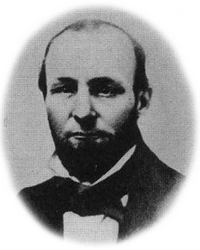I called on the custom-house authorities to get my affairs settled, but was only able to accomplish a part. They require me to get permission from the governor to remain, even a few days, in Manilla ; and also some responsible person to go with me to the governor, and give bonds for my debts, respectful behavior, &c. &c.
After dinner I rode a few miles into the country with Mr. Napper, calling at two houses, both Indian. The first was one of the poorer class, — not the best nor the worst of its kind, — and was built of bamboo, cane, matting, thatched with straw, &c., and raised four or five feet from tho ground on four piles. The inside was ornamented with various pictures, splendid crucifixes, &c. They offered us water, cigars, and betel-nuts. The other was a large house, built in the Spanish style, and occupied by the priest, a Roman Catholic Indian. We did not see him, but saw the uncle’s daughters, and their cousins. One of the daughters was sick, and, learning that I was a doctor, requested my advice. At glance I saw that she was inclining to consumption. It was not a little difficult, and a slow process, to question her concerning her case, as she spoke only the Indian language. I was obliged to call in Mr. N. to interpret ; and he, not speaking the Indian language much, was obliged, in turn, to ask the cousin, and the cousin the patient. The answers came in Indian to the cousin, who translated them into Spanish for Mr. N., who translated them to me in English ; and, by the time it reached me, I had almost forgotten the question I had asked. I ascertained, however, that my first surmises were correct, and wrote a prescription, directing the regimen, and other particulars.
The cousin was a pretty and finely-formed Indian girl, dressed in the Mestizo fashion. After some acquaintance with her mother and other friends in the adjoining room, she became full of her jokes and prattle. She said she had lost her love lately; he had died, and sho wanted to know whut she should do for it.
I told her the best restorative was plenty of air, exercise, an occupation.
“ O! ” she says; “ American dottor, humbudd ! ”
On our return we went to the Indian theatre. The play was taken from scenes among the Moors and Christians. The band, the scenery, acting, costumes, fancy dance by a little girl and boy, the style of the house and boxes, were all very well. The building was put together very rudely, the timbers inside being tied together with rattan strips. The ceiling was like basket-work, painted white. Chairs were used for seats, and the floor was like those of our theatres at home. The audience were mostly Indians and Mestizos, and nearly all were smoking — women, men, boys and girls; and the alcalde (the governor) even made his appearance with a cigar in his mouth, and sat for an hour, though the Spanish seldom attend. We could not understand a word said, for all was in the Indian language. The ticket-master would not take our money, but told us, with a low bow, to ” pass in ; ” and we met the proprietor, who politely, though in Indian, gave us seats.
